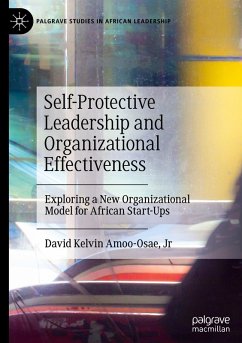This book investigates and explores the impact of a self-protective leadership (SPL) style on the organizational effectiveness of start-up businesses within Africa, focusing on Ghana and Kenya. Self-protective leadership is defined as a leadership style that focuses on ensuring the safety and security of individuals and groups through status-enhancing and face-saving tactics. A typical self-protective leader can make decisions, and is free from political influences, but tends to be selfish, ritualistic, and self-centered. The author's study, presented in this book, demonstrates a surprisingly high preference for SPL among Confucian Asian, Latin American, Middle Eastern, and Sub-Saharan African nations - all of which have a history of colonialism. If this is true, then SPL could be better suited to the business environment in Africa, but particularly amongst start-up enterprises.
Examining this phenomenon, and using an explorative analysis of business and culture, the book investigates the extent to which the various dimensions or demonstrations of SPL impact organizational effectiveness in African start-up businesses.
A valuable contribution to literature and research on African leadership styles, this is an ideal resource for students and researchers interested in leadership and organizational effectiveness within the African context.
Examining this phenomenon, and using an explorative analysis of business and culture, the book investigates the extent to which the various dimensions or demonstrations of SPL impact organizational effectiveness in African start-up businesses.
A valuable contribution to literature and research on African leadership styles, this is an ideal resource for students and researchers interested in leadership and organizational effectiveness within the African context.








